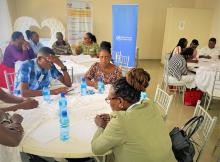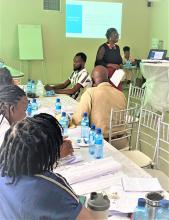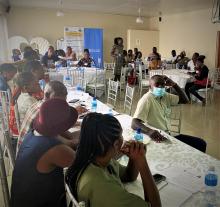Making every school in Namibia a health promoting school
WHO Namibia with support from the Regional Office in Africa trained 45 school staff, nurses, and school board members from schools in the Oshana region as part of the SURGE flagship programme. The aim of the training was to increase capacity of schools to implement the health promoting school initiative and prepare better to minimize impact of health outbreaks and other public health events on schools.
Namibia established the School Health Programme in 1990 with the aim of promoting the health of school going children and ensure that Namibian learners have optimal conditions to grow, develop and learn. Since then, school health has been a core component of the country’s Primary Health Care strategy and in 1998 the country adopted the WHO Health promoting school initiative to promote and strengthen school health. The goal of this initiative was to provide comprehensive health services for all school-going children including annual health screening, provision of safe water and improved sanitation, promotion of healthy lifestyle and good nutrition, and ensuring safe spaces for learners and school personnel. A National School Health Policy was launched in 2008 and a new revised policy is in draft to ensure that all school children in Namibia acquire the knowledge and skills they need to make informed decisions about their health and wellbeing and to improve their quality of life.
The training in the Oshana region is the first in a series of trainings planned for 2023 under the WHO AFRO SURGE flagship initiative in Namibia. COVID-19 drew attention to the deficits in education and health systems to ensure that learners are protected from the impact of major public health events and can continue their education with minimum disruptions. A recent unpublished UNESCO regional report on the Impact of Covid-19 on Adolescents and Young People’s Sexual and Reproductive Health and Rights (SRHR) in Eight ESA Countries, highlighted the impact of COVID 19 on learners in relation to access to essential sexual and reproductive health information, exposure to gender-based violence (GBV), increased pregnancy, and continuation of schools. According to the report, 600,000 learners were affected by the lockdown. Urban males reported their top three sources of information on SRH to be their sisters (35.7%), mothers (20.1%) followed by church and community at 5% each. The results related to GBV, learner pregnancy and school dropout are alarming:
- 3,625 learners reportedly fell pregnant during the COVID-19 lockdown period compared to 1,542 learners in 2019,
- 10,478 GBV cases were reported post COVID lockdown compared to 5,000 pre- COVID-19
- School dropout rates increased to an average of 30,665 from 10,000 average per year
Participants at the workshop shared their experiences relating to creating a conducive learning environment, highlighting poor water and sanitation infrastructures in schools. They also referred to challenges with placement of learners with special educational needs, alcohol abuse, violence against children and learner pregnancies. These experiences are not unique to the Oshana region. The 2021 Multidimensional Poverty Report indicated that 67 percent of Namibians do not have access to improved sanitation facilities, and this is more pronounced in rural communities with close to 94 percent lacking access to improved sanitation. The Global School-based Student Health Survey (2013) found 45.4 percent of girls and 47.9 percent of boys aged 13-15 been bullied, 58.2% have consumed alcohol, 38.4% experience physical violence and 40.2% attempted suicide. The introduction of the health promoting school initiative provides teachers and nurses with a strategy to address these challenges and provide systematic sustainable solutions over a period. The need to train the regional school health committees, school staff and school boards, and health care providers is imperative to ensure that schools in most of Namibia embrace the health promoting school initiative.
WHO has been working with other UN agencies (UNICEF, UNFPA and UNESCO) to strengthen the implementation of the Integrated School Health and Safety programme and will continue to support the Ministry of Health and Social Services and Ministry of Education, Arts and Culture to specifically scale-up the implementation of the Health Promoting School Initiative.







